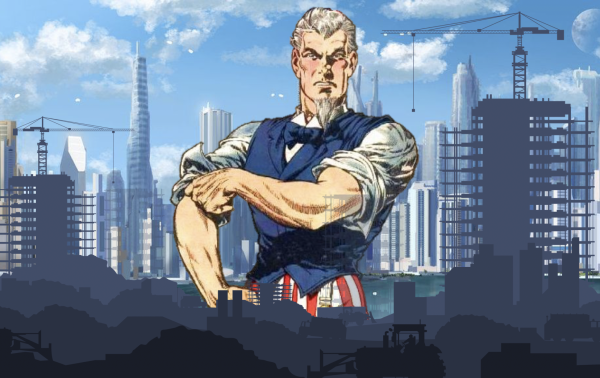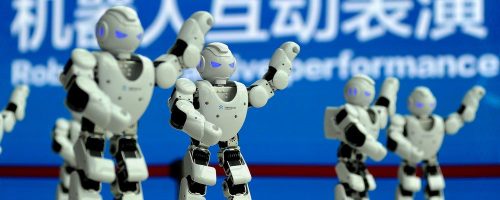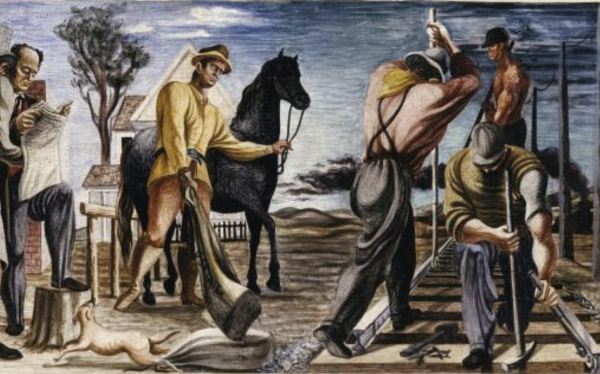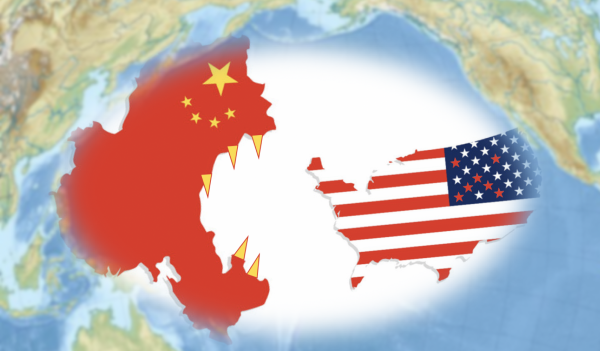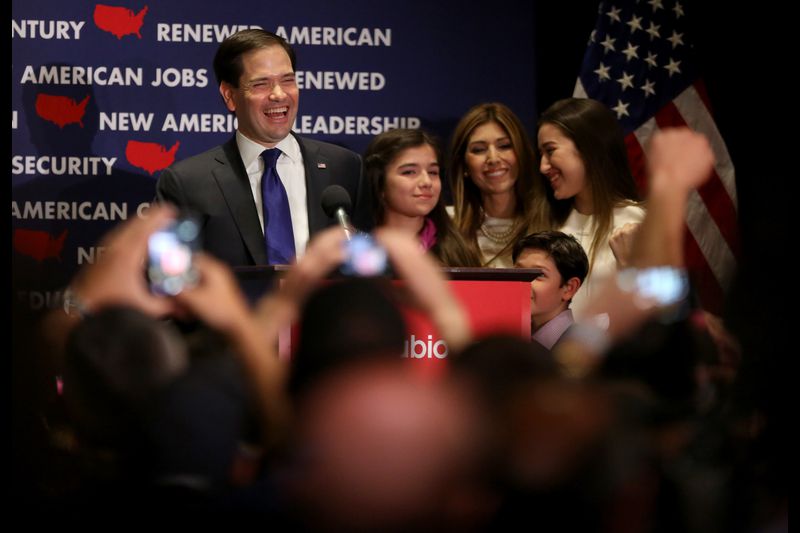Building state capacity isn’t an ism.
America’s Economic Troubles Are Bigger than China

The fix demands more than blame for Beijing.
Florida Senator Marco Rubio’s recent speech calls for an industrial policy as a key pillar in contesting our “near-peer” China. Many would argue this is the kind of “new” thinking that conservatives and the Republican Party need for future policy and political development.
Rubio defines security and national interest expansively. He states explicitly that the creation by government policy of “dignified” jobs and manufacturing work must be part of a successful challenge to the surging Chinese.
As in his Common Good Capitalism address last November, Rubio speaks with nationalist urgency to our problems. However, he hangs far too many of our ills on a materialistic diagnosis. Without explicitly naming it, he attributes to so-called “China Shock” (i.e., the loss of manufacturing jobs to China) the vanquishing of our families, marriages, small towns, and civil society.
If only the causality of deaths of despair, male joblessness, marriage decline, and births outside of marriage were that linear—and not the result of numerous policy, cultural, religious, and social feedback loops that stretch back for decades!
Between Naïveté and Nationalism
Rubio is surely correct to note that the “last several years have brought a long overdue and almost too-late readjustment to our views on China.” He observes that America finds itself locked in an intense national power competition with China, one we have been fighting for three decades now. This national reckoning must dispense with our singular naïveté about China.
As Abe Greenwald argues in his recent Commentary essay, the post-1989 belief that we would shape our former adversaries into being more like us—liberal, prosperous, democratic, and peaceful persons—has failed. If anything, we became more like them. Rubio references the fact that Marriott fired an hourly-paid employee in Omaha for merely “liking” a Twitter post from a Tibet freedom group. We might list many other shameful episodes in which American corporations have silenced or punished their employees, if not executives, for engaging in speech their Chinese paymasters deplored. That must end.
More worrisome, Rubio details China’s aggressive moves in the South China Sea, the way it has violated WTO rules in stealing intellectual property, its violations of its agreement with the people of Hong Kong, and repression of its Uyghur Muslims and for that matter, all religions in China. All of these factors, and others besides, require fresh thinking for our future relationship with China. Certainly, hard choices need to be made on a number of security, diplomatic, and economic fronts.
Does this support Rubio’s invocation of an industrial policy that goes beyond mere national security to include attempts to re-engineer an industrial base for workers generally? There is clearly a national security exception to free trade when that trade would pose a threat to the nation, as noted by Adam Smith in Book IV of Wealth of Nations. The rub, though, is how national security is defined when articulating this exception to free trade.
Rubio states that more than security is on the table: “the decision to observe when the market advances the common good shouldn’t just be limited to those instances in which its determination runs contrary to our national defense.” He goes further: “the loss of productive, dignified jobs for Americans represents an existential threat to the common good.” That means it is in our “national interest to ensure that productive new jobs are not only available to Wall Street and Silicon Valley but to working Americans across all of our nation.”
The crisis will not go to waste. The question for conservatives here is: if this elastic prescription by Rubio is accepted, will the limits to government meddling in the private sphere become almost impossible to define?
Conservatism doesn’t necessarily equate to small government, but it does demand clear demarcating lines between government and civil society. Rubio’s plan obscures these lines, and his logic of using a foreign policy problem to support domestic economic policy may demolish them.
A Double Game
In the name of national security, Rubio shall not grow weary, nor shall he rest until widget makers from across America’s heartland are protected from foreign competition and free trade agreements. Somehow, this will aid us in the contest with China.
This ignores the larger reality that an industrial policy will enfeeble our economy; it ignores that we have great jobs, and many more jobs now than there were during the high mark of manufacturing employment. But slogans about returning manufacturing jobs actually obscure the real problems Americans face.
Industry protectionism will also prove a further boost to the growth of government. Rubio at one point notes that we need to continue with President Trump’s regulatory rollback, while at the same time he wants to empower bureaucrats to rebuild our manufacturing sector. Which is it?
Even if manufacturing wages are, on average, higher than service-sector wages (which data from the Bureau of Labor Statistics contradicts), industrial policy interventions will not create more manufacturing jobs in the U.S. that pay as high as the current manufacturing average. This is as simple as supply and demand. Relying on state-based interventions in the economy to create any further manufacturing activity in the U.S. that uses human labor would be a less-efficient use of whatever resources and labor are diverted into that manufacturing activity.
Existing manufacturing jobs in the U.S. pay wages at their current level because these jobs are worth using relatively high-skilled American workers to perform (while manufacturing jobs performed in other countries are jobs worth using for the performance of those workers in other countries). The only alternative is for government to prop up manufacturing wages. But that would come at the expense of workers in every other industry, not to mention consumers.
Rubio claims that “The depletion of America’s manufacturing sector has left us with a tremendous national security vulnerability.” If so, we’ve been vulnerable for quite some time. The decline of manufacturing work stretches back to the 1950s, and since 1961 it has declined at an annual rate of 0.4% regardless of other factors in the business cycle. The St. Louis Federal Reserve notes that the manufacturing share of nominal GDP has declined from 28% in 1953 to 12% in 2015. This same sector’s share of real GDP has held steady since the 1940s (between 11% and 13%); in 2015 it was 11.7%. Growth in manufacturing has paralleled the growth in the economy the past 70 years.
Moreover, if our vulnerability to China arises because of our depleting manufacturing employment, then it’s a trait we share with virtually every western country.
Pushing on Strings
American manufacturing jobs did decrease significantly from about 19 million in 1979 to 12 million in 2016. During this same period, employment in the country’s non-manufacturing sector grew from 99 million to 151 million jobs. Should we rely on an industrial policy to coerce these workers back into manufacturing jobs?
In the decline that free trade, apparently, inflicted on our economy, U.S. manufacturing output is 45% higher now than it was when NAFTA took effect in 1994. Manufacturers in America produce 11% more output than when China joined the WTO 18 years ago. U.S. industrial capacity is 66% greater now than when NAFTA was launched, and it’s 15% higher than when China joined the WTO. The Industrial Production Index tracks the output of manufacturing, mining, electric, and gas utilities, and currently this output is at a record high.
Rubio enlists the Small Business Administration (“SBA”) as a frontline soldier in our defense against Sino-dominance. Says Rubio: “I want to modernize SBA programs so they prioritize encouraging investment in high-potential firms in strategically important industries.” Of course, if certain weapons and technology are perceived to be essential to future conflicts, or future weapons inventions and uses are needed, then government should fund them.
Bringing in the SBA seems superfluous to this purpose. If we need to strengthen and improve current collaborative government-corporate labs for military technology, then by all means let’s do it. I certainly don’t question the patriotism of SBA bureaucrats. I do question their ability to know, understand, and act in profitable ways with the many types of information needed to make profitable business decisions.
The SBA is a contradiction in terms. Small business implies, well, something small and organic, a coming together of a few people in a local operation to serve niche markets. What’s “small” about a massive federal agency injecting money into businesses coast-to-coast in the name of national security?
We already have thickly traded capital lending markets in the U.S. Is there evidence these lenders no longer are seeking profitable businesses? What does the SBA contribute here exactly? SBA loans to small businesses are non-dischargeable forms of debt, which suggests that much of the taxpayer money they lend to small businesses isn’t well used and must be recouped by the federal government from the failed businesses that use it.
To be sure, Rubio takes on the central challenge to industrial policy that the government is dismal at picking winners and losers in the economy. Rubio attempts to turn this argument back on its proponents when he states that “the truth is we are already doing that.” That is, China is picking America’s winners and losers.
The irony, though, is that Rubio later in the speech clearly states the industries the SBA would invest in under his policies are the same ones that China is trying dominate in international trade. So China is still picking, I guess.
How the Other Half Lives
Rubio’s solution does not take into account the fact that China, in part owing to the weaknesses generated by the tyrannical impulses he cites, may not be the behemoth kingdom that he fears. Moreover, to use industrial policy to undergird the same industries that China is using its government to advance links us to their business and security strategy. But this means we are operating in the same knowledge and feedback loop as the Chinese government.
The prospect opened by market capitalism, one fully shareable with our security needs, is that the knowledge needed to support investment, research, production, and logistics decisions is only disclosed in a precise, time-sensitive, detailed, and discoverable manner in pieces to certain actors with deep and regular experience in very particular sectors. The idea that either the Chinese government or the SBA possesses such a skill-set is laughable.
China is straining under the weight of its own commandeering and consolidationist measures, as many have noted. Its well-known demographic problems will increasingly become a millstone around its neck. Its workforce size may have already peaked, and its population is certainly an aging one. China has exhausted its demographic dividend and its advantages of cheap labor. Its sovereign debt levels are at a staggering 300% of GDP as of July 2019 but are apparently necessary to shore up its slowing economic growth rates.
Can China now surmount the “middle-income trap” successfully and achieve broad-based economic growth? To do so would require the key institutions needed for economic growth: courts, the rule of law, property rights, and transparency and accountability of government officials to its citizens. Does this sound remotely plausible in China right now? To ask such a question is to answer it.
I’m not arguing that China is about to fall because of these problems, or that China poses no serious threat to America. At the least, the Chinese goal of dominating the South China Sea is of great concern, and our response to it has been suboptimal. Strangely, Rubio’s speech does not dwell on the most efficacious response to such provocations, which is to rebuild our Navy.
To that end, the Pacific Trade Partnership, rejected by many in the Republican Party who will surely wave the flag at Rubio’s proposals, was meant to strengthen our relationships with Asian nations who fear China and the turning of the South China Sea into a Chinese lake. In rejecting this partnership, America lost the opportunity for closer trade and investment cooperation with nations who have every interest in deepening ties with us. Stupid is as stupid does.
In short, our security challenges with China are immense. Rubio is right that our government will need to continue to rethink our approach to China on multiple fronts, and that security concerns may dictate exceptions to free trade. Answering this security threat with an industrial policy led by the SBA to increase manufacturing and other types of “dignified” jobs would serve to impair our economy—and pose a threat to political and economic freedom.
The American Mind presents a range of perspectives. Views are writers’ own and do not necessarily represent those of The Claremont Institute.
The American Mind is a publication of the Claremont Institute, a non-profit 501(c)(3) organization, dedicated to restoring the principles of the American Founding to their rightful, preeminent authority in our national life. Interested in supporting our work? Gifts to the Claremont Institute are tax-deductible.
Don’t remake America: reinvent it.
Time is pressing to turn our tech Titanic around.
America thrives best free from market worship.
Actual policymakers have to do that.
Congress Should Join the Discussion Senator Rubio Has Begun.

